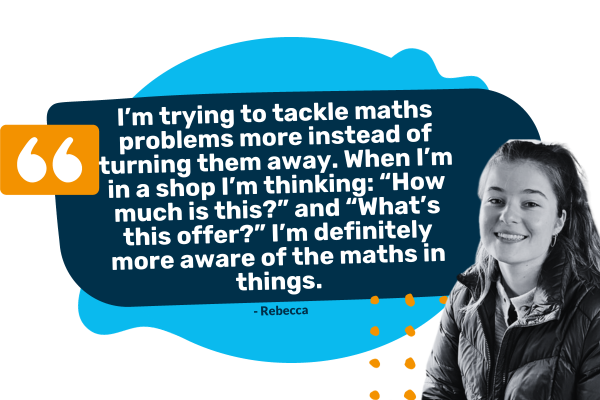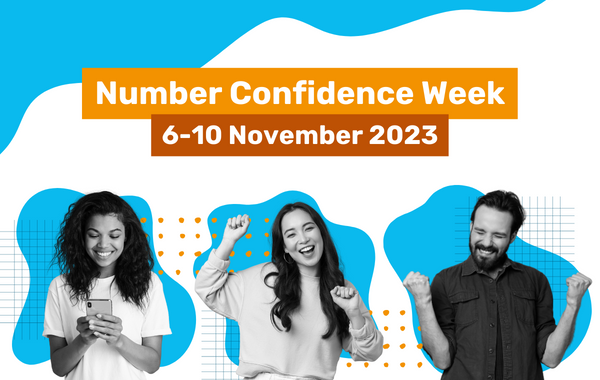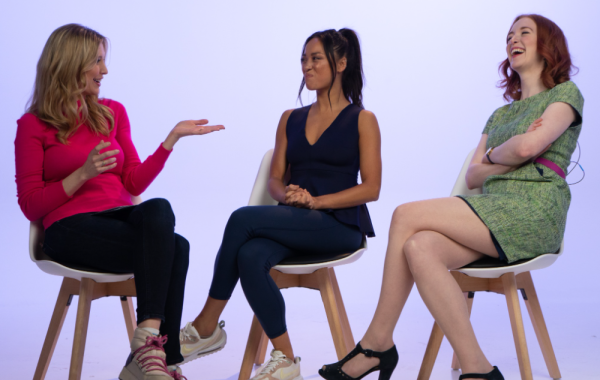I was always struggling with maths, it was just something that I could never understand in my head. At school, I was always in the bottom set for maths. I had a really lovely teacher, but I just always struggled. I found it in everyday life as well. I used to work in a shop and if somebody talked about change, I panicked.
I found GCSE Maths quite stressful because I knew it was such a hard topic for me, I had to really revise for it. But when you struggle with it it’s hard to do the revision. I failed my first exam and then it started a lot of retakes.
Each time I resat the exam I did feel a bit more confident, but when I failed it knocked my confidence and I just got more and more annoyed with it. I took it four times in school and failed every time so it was that one thing I just couldn’t do.
Revisiting maths learning for an apprenticeship
I am currently doing a travel consultant apprenticeship. For those of us who didn’t have a C grade in GCSE Maths, we were set up to have maths lessons via Zoom, so we could work towards sitting a City and Guilds Functional Skills Maths Level 2 exam.
During the training I learnt that Functional Skills is much more about everyday maths rather than things like simultaneous equations and trigonometry. For example, in some past exam papers I’ve had questions about exchange rates, which is obviously relevant to the job I’m doing.
I feel like in school we should definitely be taught more about things like mortgages and car insurance. At school you learn about algebra and areas of a triangle, but I think if we did more real-life things that would be massively helpful. I’m 25 now and thinking about the future and I’ve got no idea about looking for a house and things like that.
Young adults and maths understanding
National Numeracy have found that 18 to 24-year-olds are the most maths anxious adult age group, and I think it’s because people are leaving education without knowing enough about important things like renting and understanding bills.
If you’re at university or college you’re not necessarily earning – you might have a job but sometimes people don’t – so you need to be aware of the cost of things. Even if you do have a job, you need to work out how much you’re earning and how to pay your rent and things like that.
Preparing for the exam
I took the Functional Skills exam after around seven months of maths training. I felt really nervous, I hadn’t taken a maths exam for a while, so I didn’t know what to expect and I didn’t like how you didn’t know which questions were going to be asked. Unfortunately I didn’t pass, but I was proud as I got a good result for me and I became more determined to pass the next time.
When I took the exam for the second time, I was still very nervous because maths exams always scared me. I did lots of revision and tried to get into a routine of doing it every evening leading up to the exam. I did the most revision I’ve ever done and selected a topic or some questions to do of an evening, going through them and recapping them the next day.
And I practised with lots of exam papers. Our teacher always said to do exam papers because you’ll get into the routine of the kind of questions you might be asked. The exam papers were really helpful for time management as well and when I was in the real exam I felt that my time management was better.
When it was over I felt confident, but still nervous because you never know how it’s going to go.
When I was told I had passed I just burst into tears, I was so excited!
The team I work with got me some presents and it was really nice because the hard work had paid off. Everyone says if you work hard at something it pays off and it really did show that it does.
To anyone else who is doing training and has an exam coming up I would say: "Keep working hard and keep revising. Find a routine because you will get into it. Don’t worry too much, just take it in your stride and if you need help, ask people." I had a few situations where I just couldn’t get one question right and I just asked someone and they helped me.
Afterwards, when you’ve done all the hard work and you’ve passed, it’s a massive relief and you don’t have to do it again!
Newfound confidence at work
At work, I’ve been in our travel money bureau a lot more now and having the pass underneath my belt has made me more confident being there. Before, I’d think: “Oh, I haven’t passed maths,” but now I’ve passed it I’ve got more confidence to be like: “I actually can do this.”
Just working out if a customer needs a discount, or working out how much of my target I’ve reached – percentages have been a big part of those things. I definitely feel better towards maths now. Now I’ve got this pass mark I feel I actually can do it.
Confronting maths rather than avoiding it
I’m trying to tackle maths problems more instead of turning them away. When I’m in a shop I’m thinking: “How much is this?” and “What’s this offer?” and things like that. I’m definitely more aware of the maths in things.
Maths is all around us, we use it every day. Maths is valuable and being more aware of percentages now, I’ve been able to look more at offers when shopping such as a tag that says ‘25% off’.
Trying the National Numeracy Challenge
I have tried the National Numeracy Challenge – I liked how it gradually got a bit more tricky, so it started off with quite simple questions, then went into a percentage increase question and things like that. The percentage increase question was about rail fares, which is everyday life, so I think those questions are really good. It tailors towards your ability and I found it really easy to access, I just went onto the website and created an account.
I’ve been reading other people’s stories on the National Numeracy website too. It’s nice to see them because you realise you’re not going through this by yourself. It’s a really lovely site and it’s so easy to use as well.
To anyone who might be nervous about improving their maths skills and confidence, I would say: “Just do it!” If it means you can pass an exam or improve a little bit in your maths, definitely do it because it will pay off.







